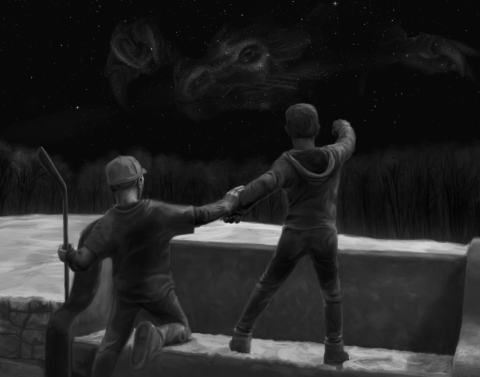“Scenes from a Life of Sport” by Robert Shuster was published in NAR issue 301.3.
Some years ago, a friend of mine asked the writers she knew to compose a short piece, on any subject, as a gift for her thirtieth birthday. I found the request delightful—I was, I must admit, rather smitten with Jan’s charms—but didn’t quite know what to do. Something philosophical? Something funny? A page of epigrams? Somehow what came to me (the idea’s origin is lost to time) was, of all things, a series of sports-related vignettes centered on a nameless boy—all taken from childhood memories, many of them dating back to the early 70s, when I’d lived in upstate New York. Though Jan didn’t have much interest in sports (as I recall), I was inspired enough to produce several pages, far beyond what she’d asked for, and I happily delivered “Scenes from a Life of Sport.” She sent back a note telling me how much my contribution pleased her, and that was that.
Soon after, I stopped writing short stories to concentrate on a novel, and the piece was pretty much forgotten, collecting digital dust for over a decade, transferred from one computer to the next, always in an overlooked folder titled MISC. But novel writing is a long and lonely business with no guarantee of success at the end, and with few, if any, in-between rewards. Hoping for a more immediate boost of approval, I went back to review a number of unsubmitted things, rediscovering the sports vignettes, thinking they were decent enough to bring into the light.
Still, the piece didn’t seem ready for publication. As a work of reflection, it was too fragmented, lacking a cohesive theme. And my use of third-person narration—intended to create a more daydream-like effect—did not speak to the category of personal essay. The more I considered the work, the more it suggested a conversion to fiction. The decision was liberating, and I quickly found the “glue” that would connect the individual sections: each one would end with a related glimpse of the boy’s future, conveying the arc of his life with the ironies of time’s passage.
Despite its simplicity, or maybe because of it, the piece went through numerous revisions. (There was no quick boost. I would complete three novels before I stopped tinkering with the story.) After my father’s death, I expanded the last scene, adding emotional weight by reversing the sequence of time: it begins with the boy’s future—a dying man—and ends with the distant past, a simple father-and-son bicycle ride along an abandoned railroad bed. The real ride, probably made in ’68 or ‘69, still remains vivid to me, especially its indelible vision, where the rails seemed to touch, of infinity. My father, who never threw anything away, hung onto his old Raleigh, perhaps as a symbol of a healthier time, and through several moves and against my wife’s protests, I have kept it, too, preserving that six-year-old’s enthralling notion of endlessness.




